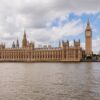Roar writer Molly Green argues why the UK government’s new anti-obesity campaign could cause more harm than good to UK public health.
While battling coronavirus in April, Boris Johnson’s slow recovery and the severity of his symptoms were blamed on his weight. In launching the new anti-obesity campaign, he said he was “too fat” when he caught the virus. He now proudly shares his weight loss whilst suffering from respiratory disease, without considering how his wealth enabled his new, “healthier” choices.
As part of the campaign, TV ads for unhealthy food – what I understand to be defined based on calorie content – won’t be shown before 9 pm, and deals such as buy-one-get-one-free on these foods will be banned. This will make them less accessible, supposedly to encourage healthier food choices. Large restaurants have to put calorie counts on their menus to encourage people to choose lower calorie meals. Labelling on alcohol will also more clearly state calorie content.
Finally, the government say they will expand NHS weight management services to support people to lose weight. This will include developing obesity-related self-care apps and online tools and accelerating the NHS Diabetes Prevention Programme.
From next year doctors will be offered incentives to ensure people living with obesity are given support for weight loss and primary care staff will also have the opportunity to become “healthy weight coaches” though training delivered by PHE. Separately, GPs will also be encouraged to prescribe exercise and more social activities to help people keep fit.
However, these measures assume that people base their weekly food shop on nutrition rather than socioeconomic factors. It feels like the current rhetoric is telling us that some people can’t be bothered to cook and eat healthier meals, that a poor diet is merely a sign of laziness. Ending BOGOF offers directly affect the poorest, making food more unreachable to those in poverty.
Firstly, changes to how supermarkets discount certain items will only mean that those with low incomes who depend on offers on cheaper “unhealthy” options will lose out. Low-income households are expected to source healthy meals that involve often perishable ingredients. If income is uncertain, long-lasting, frozen ingredients will take priority.
Poorer people also tend to work long, antisocial hours, perhaps juggling multiple jobs, and often don’t have time or energy for shopping or cooking. Exhaustion and raising children who might not eat certain foods makes fast-food options far easier. Children shouldn’t eat too many processed foods, of course, but a ready meal is surely preferable to starvation.

The new measures overlook systemic issues that the government could solve but aren’t. The Tory government made plans to cut free school meals, but why not alternatively make healthy lunches free and compulsory in schools?
Only months ago, middle-class columnists on Twitter justified paying a cleaner by arguing that household chores are too time-consuming to do alongside full-time work. Why is 40-hours a week in an office more legitimately exhausting than any other profession?
For those with, or recovering from, eating disorders, calorie-counting is only ever detrimental. Mental health services are already underfunded, and more and more young people will risk developing eating disorders. BEAT Chief Executive Andrew Rashford says, “it is worrying to see a renewed emphasis on calorie labelling, as the evidence clearly shows that these risk exacerbating eating disorders of all kinds.”
Incentivising doctors to refer patients to weight-loss programs will worsen an already fatphobic health system. Attitudes to plus-sized people are already negative and the BMI system has been shown many times to be inaccurate and particularly racially biased. These measures will place unwarranted focus on weight and direct health professionals to quickly identify this as the cause for illness. Misdiagnoses and slow referrals will rise as a result.
Possibly the most ridiculous aspect of the announcement of an anti-obesity campaign is that it comes only weeks after the launch of the Eat Out to Help Out campaign which encourages Brits to fulfil their patriotic duty of jump-starting the hospitality industry. As obesity-related illnesses are said to cost the NHS £6 billion a year, our value is reduced to what we can pay into the economy without this repercussion.
As NHS budgets are cut, it is clear that Johnson doesn’t have our needs prioritised. The responsibility for COVID-19 mortality rates and the strained NHS has been shifted from the government to the individual.
For someone in Johnson’s position, with time, money, and resources to choose a healthier diet, it’s easy to view nutrition is a choice. In reality, the campaign completely overlooks the socioeconomic factors that dictate how we eat, demonising those who can’t make the ‘healthier choice’.
The problems the government is trying to tackle would be better solved with systemic improvement to the national standard of living, rather than straining low-income households and maintaining the privilege of the upper classes.


















